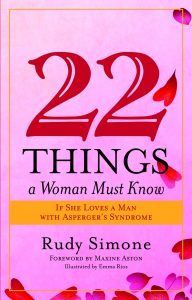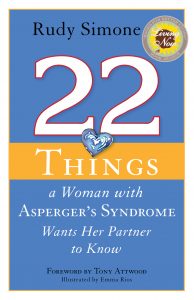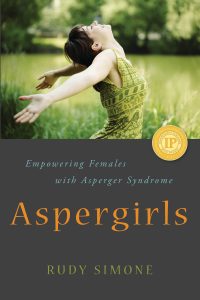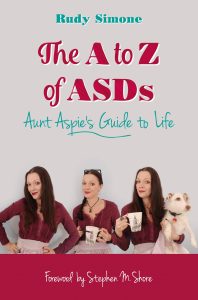
Although best known for her book Aspergirls Rudy Simone is a person of many parts (actor, musician, public speaker, AS consultant). With her latest book The A to Z of ASD’s: Aunt Aspies Guide to Life about to be published Rudy spoke with us about The International Aspergirl® Society, and her plans to improve the lives of girls and women on the autism spectrum around the world.
*Most people will be familiar with you as the author of a number of books including the bestselling Aspergirls, but you have just started a non-profit organisation called The International Aspergirl® Society; can you tell us what you want to achieve with this exciting new project?
Rudy Simone: Like many women on the spectrum I have talents, ideas, and ambition, but often lack the networking skills to ensure that these things are not going to waste. We all hate to feel like our talents are wasted and we get lonely, so I thought let’s make our own network that we can start online and take into the real world. This is a network for the advancement of all women on the autism spectrum. Although we may be separated by geography let’s think of ourselves as stars in a constellation; no longer alone. It is time we step up and take our place in this world.
Although you are an American citizen you divide your time between New York & Paris and have chosen to establish The International Aspergirl® Society in France; did you do this for any reason in particular?
RS: First of all I love Paris; it’s an Aspie dream with a myriad of interesting sites and walks one can enjoy alone, or with others. I find Parisians incredibly friendly and gentle despite myths to the contrary. Importantly it is located in the heart of Europe where there are many autism self-advocacy and parent’s groups, and exciting tech start-ups that are helping to erode the ‘old school’ network of autism treatment that has been dominated by Freudian/Lacanian psychoanalysis. It is going through a period of growth and change that is very much for the better.
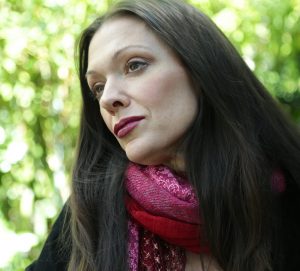 What do you think the primary difficulties are for women on the autism spectrum, and do you think they differ greatly from the problems neurotypical women face in society?
What do you think the primary difficulties are for women on the autism spectrum, and do you think they differ greatly from the problems neurotypical women face in society?
RS: Well we don’t usually have the same number of friends to spend our time with, and time with friends can really fill a person’s schedule, and enrich their life. As a result we have more time for our special interests and tend to become very expert and capable at what we do, but these skills tend not to get fully utilized because we often don’t ‘know the right people’. In addition to this we may not act, dress, or express ourselves the way that others may ‘expect’ a woman to behave regardless of whether we are supermarket cashiers, students, or executives. I don’t think non-autistics can understand us half as well as we understand them, and when you don’t understand someone it’s easy to fear them. Many of us end up getting fired because we’re different, and we make people uneasy. I have had to work very hard on my people skills to put others at ease. Sometimes I get fed up and just have to blurt things out… but I’ve learned the art of tact.
That is interesting you say that because it has been reported in the UK that up to 85% of people on the autism spectrum are either not in or are unable to get into full-time employment. What can a project like The International Aspergirl® Society do for women on the spectrum to improve this?
RS: I’ve been self-employed, an employee, a proprietor with employees, had a myriad of jobs in a variety of fields and written a book on the subject… so I’ve learned what not to do. I’ve learned what the problems are that we face whether they be sensory, social, emotional, physical, or cognitive. Once we have a physical headquarters for the society I’d like to take that further and offer employment training and liaising. I’d like to offer employers workshops on understanding Aspergers in the work environment because they need to know what talents we have and why we should be hired. One of my Paris ambassadors already has a company that does something like this and we are a co-op of sorts. We will put people in touch with each other pooling our talents and resources while always keeping the advancement of women on the spectrum as the ultimate goal.
The International Aspergirl® Society is a young organisation and it sounds like it is trying to attract younger women on the autism spectrum who need this kind of support network, but what is your message to women who have received an Asperger’s diagnosis later in life?
RS: Our members currently range in age from about 19 to 60+. Our ambition never stops, and our challenges never cease. I’ve been asking members, some of whom are highly successful women, to write articles and suggest ways in which they could help. It’s interesting that for those who received diagnosis later in life it is every bit as much of an ‘a-ha!’ moment as it is for the younger ones. We often have the same questions about disclosure, dealing with family, etc. and our older members can be just as isolated if not more so than the younger ones. I know too well the pain of isolation and rejection, and I can’t bear to think of how prevalent this is among our demographic.
Having good social skills is one thing that people on the spectrum really struggle with and from the outside with all the projects you have going on (the IAS, a new book coming out, writing and performing music) you make being sociable and connecting with people look easy; is that even remotely the case?
RS: That depends; I’ve been very lucky lately in that I’ve developed a few relationships with people that have been very rewarding, warm and close. But put me in a party with a bunch of non-autistics and my ‘glass bubble’, as I like to call it, will soon have me sitting at the end of the table trying to look like I belong and forcing me to create an illusion of normalcy. This never ends. I’ve had to learn to love my bubble, and learn how to pop out of it once in a while knowing that it is never for long. I’ve also learned who to invite in, or just to chat with through the window. When I was younger I wanted to smash the bubble, but that is not something I aspire to do anymore. My closest friends are always on the spectrum, or those who have been through some trauma akin to being in a war. They get it!
Finally how does someone go about becoming a member of The International Aspergirl® Society?
RS: You go to the home page of our site (http://www.aspergirlsociety.com) and choose which membership option you want… I’ve kept the cost as low as possible. We do not ask for proof of diagnosis, and we accept all those who identify as female. If you are a man, a nonautistic woman, or you just want to help you can buy a membership for a friend or sponsor us. I started this by invitation only but the good momentum has continued and everyone who has joined is super cool. I know because I meet each and every one of them, when they are ready, on Skype and sometimes in the real world. It’s unbelievably rewarding to me to bring counsel and hope to other women on the spectrum, and I often receive some from them. I never dreamed when I wrote Aspergirls that I would be doing this, but now I can’t imagine not doing it!
It is an idea whose time has come.
*Questions from Rob Rorison
Rudy Simone’s latest book The A to Z of ASD’s: Aunt Aspie’s Guide to Life is available soon from Jessica Kingsley Publishers. For more information on all of Rudy’s JKP books (including Aspergirls) visit intl.jkp.com
